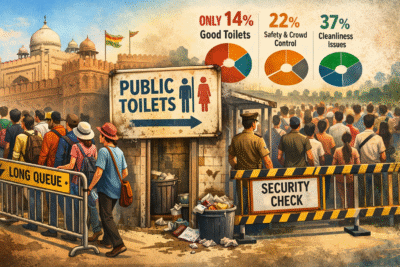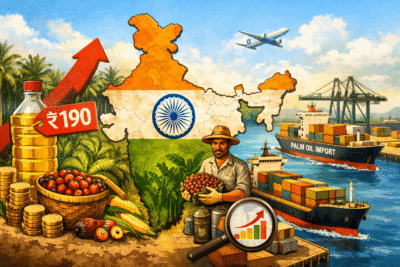
India has entered into a free trade agreement with four European countries. It is said that this agreement will create 10 million jobs in the next 15 years.
Minister of Commerce and Industry Piyush Goyal announced it on social media platform X. He said that these four European countries will invest $100 billion in India.
Switzerland, Norway, Iceland, and Liechtenstein (EFTA countries) are included in these European countries. None of these countries is part of the European Union.
Negotiations for this trade agreement began in 2008, and then the talks stalled in November 2018. After that, discussions resumed on it again in October 2016.

Before the final stamp was put on the agreement, a total of 21 rounds of talks were held. Now, the agreement has been signed.
This agreement is a significant one in terms of the FTA (Free Trade Agreement) because it makes investment obligatory.
Prime Minister Narendra Modi described it as a historic agreement which would create jobs for the youth of the country.
Norway’s Minister of Trade and Industry, Jens Christian Vastrai, said, “Relations between India and Norway are currently at their best.”
While India will receive significant investment from this deal, European countries will gain easy access to one of the world’s fastest-growing economies, benefiting from processed foods, beverages, and electronic machinery in return.

Piyush Goyal said that this agreement will benefit businesses such as pharma, medical devices, food, research, and development.
Modi said, “March 10, 2024, is a historic moment in relations between India and EFTA countries.”
“In many aspects, despite structural diversities, there are alignments in our economies, which will create beneficial situations for all countries.”
Modi said, “Each of the four countries is a global leader in different aspects. By being leaders in various sectors like financial services, banking, transport, logistics, pharma, and machinery, these countries will open new doors of cooperation for us.”
In Hindi, Vastrai, said, “Today is a historic day.”
Vastrai said, “This is truly a day to be recorded in the history books. It’s a new way of doing sustainable business. Increasing investment and creating jobs are our commitments so that we can achieve the objectives of this agreement.”
What will be the benefit to India?
Of the four countries involved in the agreement, Switzerland is India’s largest trading partner.
In 2022-23, bilateral trade between the two countries was $17.14 billion, while trade with all four countries was $18.66 billion.
The Swiss government has called the agreement a “milestone.”

After this agreement, India will temporarily or gradually remove customs duties on high-quality Swiss products such as Swiss watches, chocolates, and biscuits.
According to the deal, India will immediately or gradually remove customs duties on approximately 95% of industrial imports from Switzerland, except gold.
This will reduce the prices of Swiss products such as seafood like tuna, salmon, coffee, various oils, many types of sweets, and processed foods in India.
In addition, smartphones, bicycle components, medical equipment, dye, cloth, steel products, and machinery will also become cheaper.
Ajay Srivastava, Chief of Global Trade Research Initiative, told PTI, “The price of Swiss goods in India will be cheaper because tariffs on them will be removed. The duty on wine, which is priced between five dollars and fifteen dollars, will be reduced by about 150 percent to 100 percent.”
According to Srivastava, in the coming years, the duty on cut-polished diamonds will be reduced by five percent to 2.5 percent.
How much commitment is there to investment and jobs?
This agreement is considered historic because in the next 15 years, these four countries will invest $100 billion in India and create 10 million jobs. These countries have expressed commitment to this.
Switzerland’s Economic Affairs Minister, Helen Badligar Artida, told The Hindu in an interview, “I can tell you that Swiss companies and other companies we have talked to have extensive interest in India.”
”We have reached an estimate of $100 billion through FDI in 2022, which is $10.7 billion and India’s GDP estimate and the large market here are the basis for reaching the amount of our investment.”
“The EFTA block has been successful in stamping this deal even before our European neighbors (EU), which has increased interest and participation in India. But I want to make it very clear that this investment will not be made by the Swiss government but by private companies.”
“If for any reason we cannot invest $100 billion, then we will withdraw.”
Switzerland’s Minister of Economic Affairs, Guy Parmelin, said, India is a country that provides “vast opportunities” for trade and investment. This deal will give Switzerland access to India’s technology.
This agreement will also benefit the pharma and medical device sectors. Indian exporters will also get good access to the markets of these countries.
This agreement has a total of 14 chapters, which include government procurement, investment promotion and cooperation, trade facilitation, and intellectual property protection.
Provision has been made for a review of this agreement two years after its effective implementation.
After the first review, both parties, EFTA and India, will review this agreement every two years.
When will this agreement become effective?Every country will implement it in different timeframes. It is likely to be implemented by the end of this year.



